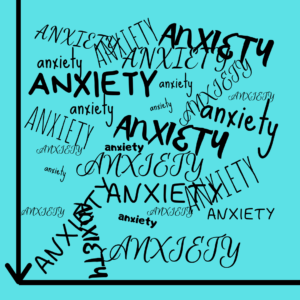5 Things You Can Do to Manage Anxiety Today
- Breathe, breathe slowly
- Name your anxiety
- Evidence check
- Notice and let go of unhelpful thoughts
- Exercise
1. Breathe to Manage Anxiety
When was the last time you stopped to pay attention to your breath? I was working with a client recently, who had had lots of therapy for anxiety and panic attacks and has had extensive experience in yoga practice, yet this client hadn’t really ever stopped to notice her breathing.
When we are anxious our breathing is one of the first things to change on a physiological level. When we are being threatened our body needs more oxygen quickly to enable it to react to fight, hide or run. Our breathing becomes shallow and quick and our heart rate increases and there’s a flow-on effect in our body such that other physiological symptoms can start to present. Symptoms specifically related to breathing  that might be noticed include shakiness, tingling, and tightness in the chest or throat.
that might be noticed include shakiness, tingling, and tightness in the chest or throat.
Can you shift your attention to your breath? Can you notice the inhale and exhale? It might be helpful to close your eyes to enable you to narrow your focus and limit distractions. It might be helpful to place one hand on your chest and the other on your stomach.
Can you notice which hand is moving? Or are both hands moving? Can you shift your breathing to cause your lower lungs to fill up before the top of your lungs? And then exhale from the base of your lungs to the top?
Can you notice the gentle rhythm of your breath? Breathing in and out gently in your own time. As your mind wanders, continually shift your attention back to the sensations of your breath. Do this as long as you need.
One thing to remember is that practicing slow breathing when we feel calm means that it will be easier to implement when we are anxious. It’s similar to sitting an exam… if we did no study for an exam we might find it difficult to perform well. Just as it’s best to study, or practice, in the weeks and days prior to an exam. So it’s helpful to practice slow breathing when you feel calm or relaxed.
Learning to slow your breathing can help you to manage the other things going on when you feel anxious a little more easily.
More information on breathing can be found here.
2. Name your Anxiety
 Sometimes it’s difficult to identify anxiety. But for many it just feels different or uncomfortable. I’ve heard it described as feeling wired, or unsteady or stressed. And there are many more words that we might use to describe how we’re feeling when what we’re feeling falls within the category of worried or anxious.
Sometimes it’s difficult to identify anxiety. But for many it just feels different or uncomfortable. I’ve heard it described as feeling wired, or unsteady or stressed. And there are many more words that we might use to describe how we’re feeling when what we’re feeling falls within the category of worried or anxious.
Naming that feeling with whatever word feels right for you can be helpful to manage anxiety. That label can help you feel like it’s normal and it might help with the next step in managing that feeling. Knowing that this is what it feels like when you feel anxious, stressed, worried, jittery, wired, unsteady, sick and knowing that you CAN manage this feeling and these thoughts is helpful.
I know it can be hard to manage anxiety … but go back to the section above… BREATHE….
3. Evidence check
Sometimes it’s called reality checking. What’s that? This is dipping into your rational thinking mind. This is really hard to do when your attention is taken up by physiological symptoms and racing thoughts.
Go back to the first section… BREATHE… Not only can slowing your breathing can have the effect of reducing the insistence of other physiological symptoms, but it can also slow your thoughts, thereby helping to manage anxiety.
If you have been able to slow your breathing you might be able to start to notice your thoughts and consider them from a distance. Ask yourself about the logical probability that something is going to happen.
Sometimes you might fear that the worst possible outcome is really going to happen, but is saying hello to someone or standing up in front of a group of people actually likely to cause you to have a heart attack??? I know that it actually feels like this is going to happen… but what’s the probability of it? Possibly quite low… What’s the probability that something good might happen?
Sometimes it’s difficult to do this in the moment. But you might have the same sort of thoughts each time you feel anxious. So maybe you can write down these thoughts when you are not anxious and consider the probability they’ll actually happen. I wonder what the probability of the opposite of your fears occurring is… What pleasant or hoped-for things might be more likely to happen?
4. Notice, acknowledge and let go
This is not always easy. But if you’ve been able to identify the unhelpful thoughts that your rational mind tells you are unlikely to occur it might be easier. When we have those unhelpful, and anxiety provoking, thoughts they tend to go around and around our mind. Our mind keeps going back to them…
But what if you can acknowledge this thought, remind yourself of the evidence checking you’ve done and allow that thought to float away? I know this isn’t easy. It takes practice. Imagery might help too… can you imagine that unhelpful thought sitting inside a helium balloon and then letting go of the string attached to the balloon?
I know that helium balloon might appear in your hand again… this is the fear reminding you of that thought. I wonder if you can accept the reminder and allow that balloon to float away again…
As you allow that balloon to float away it can be helpful to choose a something else to pay attention to. Maybe you could pay attention to your breathing… remember above… BREATHE…
Maybe you can choose another sensation to pay attention to… what about the feeling of your weight on the floor as you stand or the chair as you sit? What about smell? Or sound? Or maybe taste? Maybe you have a scent that you find calming, or maybe a stress ball could be helpful.
Continually notice, acknowledge and let go of that thought.
5. Exercise
It might seem an odd thing to suggest. But anxiety is an adaptive function that keeps us safe. It is designed to ensure our body is ready to run, hide or fight for survival. Adrenaline is pumping through our body, our muscles are tense and ready to act, our digestive system is shutting down to ensure we are able to effectively run, hide or fight.
So maybe going for a walk, or run, or bike ride, or any other physical activity that you enjoy, will help you in the moment to manage anxiety. Movement can assist the body to manage the excess adrenaline. It doesn’t actually matter what you choose to do… but some form of movement is likely to be helpful.
Research has repeatedly found exercise to be effective for the long-term management of mood and anxiety, so why not use it. It is likely to also be helpful for overall wellbeing.
It might help some people to find a slower form of movement, such as yoga, pilates or tai chi, that might help you become more focussed in the moment. These forms of movement might also help with the breath… BREATHE…
If you’re struggling with anxiety and these tips have been helpful please share them to help others manage anxiety.
If you’re ready to learn more about managing your anxiety and how to apply these strategies contact me at Enhance Life Psychology.
